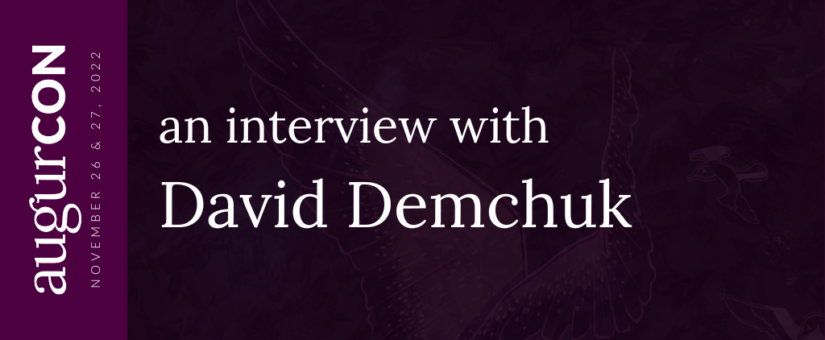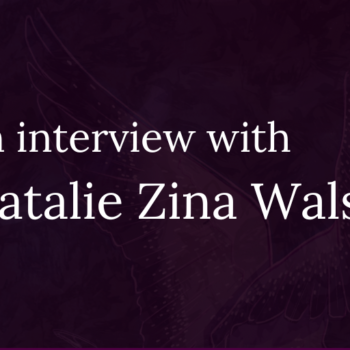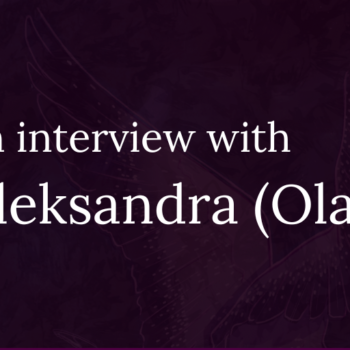
An interview with David Demchuk #AugurCon2022
- Posted by Augur Blog
- On November 17, 2022
- 0 Comments
- author interview
On November 26 & 27 we’re hosting our second-ever AugurCon, our virtual celebration of speculative literatures! We’re joined by over 45 amazing guests, including authors, poets, editors, and publishing professionals, to explore the intersections of the world we know—and the ones we dare to imagine.
We connected with David Demchuk, author of The Bone Mother and RED X, who is a panelist at this year’s AugurCon.
Get your ticket to attend his panel:
Horrific Imaginations: Mastering Fear & Tension
Sunday, November 27 at 4:30–5:30 PM EST / 1:30–2:30 PM PST
To see the full weekend program schedule, visit our website.
Let’s start at the top: tell us about your writing process! How did you start writing? Plus: Do you have any favourite writing haunts (i.e. places) or rituals?
I should get this out of the way right off the top: I don’t outline, at least not right away, but weirdly I am very attuned to structure so I often have a sense of the story’s shape, if not its content, as I begin.
When I embark on a new work, I usually start from an image or phrase that has come to me, something that evokes a character or poses a question, and I try to hold that in my head as I put down the first few pages. When I reach the one-third mark, sometimes earlier, I look backward as well as forward to get a better sense of how the story is unfolding, and then I consider what options or paths will keep me and the reader engaged and intrigued. It’s like I’m feeling around in the dark, trying to get a sense of the shape of the room and what it contains before I move on to the next one.
I tend to be a slow writer, and I keep my expectations low: 250 words a session, four sessions a week when I’m writing a book, and if I exceed the word count I can buy myself some time off if I need it. I almost always write in the late evening, after 10 p.m., when I’m barely awake. For whatever reason, that’s when the overthinking part of my brain lets its guard down and lets the more intuitive side run loose.
Even though it’s terrible for me, I usually write on the couch with my feet up on the coffee table and my laptop perched on my legs. My back is terrible!
Also, and I should have said this earlier: I do a lot of work on voice early on, using various writing exercises to help me find a voice and tone that will propel the work forward. Sometimes I’m lucky and the voice is very clear to me from the beginning; other times it’s a struggle and I can spend several weeks tinkering until I land it.
I don’t really have any rituals if the writing is going well (though I do make many cups of tea) but I have a few if it’s going badly: for example, I have a significant collection of fountain pens, and will use them to write letters or conversations between myself and my characters if I get stuck or wander down the wrong path.
You’re on our very first horror panel this year, and we’re super excited about it. But we’re wondering: if you could be on your PERFECT horror panel, what would you absolutely die to talk about?
Wow, I love this question!
I’ve actually been very lucky to have guested and moderated on some amazing horror panels, and we’ve covered a lot of ground in our discussions. But I would love to talk more about craft–how we build our sentences and paragraphs, how we choose and develop our characters and reveal them to the reader, how we use description and when, how we create suspense and dread, how we change the pace, when we use humour to release tension.
I’m also a big nerd, unsurprisingly, so I love hearing about the tools that other writers use, how they research, how they shape their work and make their choices, who they show their drafts to and when, what their editing process looks like. I’m always convinced that other writers have secret weapons at their disposal, or clever shortcuts, or are just super-smart about structure and storytelling in ways that I’m not. I’ve watched Mary Robinette Kowal’s lecture about using the MICE quotient in structuring stories about a dozen times and every time I feel like I learn something new. I am practically ancient but I feel like I still have so much to learn.
At Augur, we talk a lot about “stories for the futures we need.” We know what it means to us—but what does that mean to you? Are there any stories that have shaped better futures for you, or stories you wish you’d see more of?
I would say that sometimes the stories for the futures we need are stories about the futures we need to escape or subvert. My work is so often about what my characters need (and what I and my readers might need) in order to overcome our troubled pasts and escape our present dangers so that our communities can survive even if we as individuals might not.
It can mean acknowledging the harm that our parents or families or ancestors have inflicted on others as part of our history; it can mean grieving the losses of loved ones who have been taken from us, often unjustly and prematurely; it can mean confronting the anger that we carry and facing/embracing the monstrosity that can arise from it; it can mean giving voice to pain and fear and despair in the hope that we can heal and move forward.
I am glad to be among a new wave of queer and trans* writers who are exploring our place in horror, writing work that releases us from the conventional tropes of victimhood and villainy while investigating and interrogating the complexities and challenges our our often-demonized existence.
In your work, you’ve explored folklore, fairy tale, and the creation of your own sort of urban legend in Red X. Can you speak to how social, community-based stories create room for horror—and how anticipation and fear are cornerstones of storytelling across time?
Yikes! Well, let’s see. From our earliest campfire gatherings, elements of horror have been part of the stories we’ve told as a way of ensuring our survival. Our earliest surviving written narrative, the Epic of Gilgamesh, speaks of Gilgamesh’s intimate relationship with man/beast Enkidu–our first gay werewolf. (In a related Sumerian text, Gilgamesh opens a hole in the underworld so that he can reunite with Enkidu, embracing and kissing him and asking him questions about the afterlife.)
Folklore and fairy-tale give us archetypal characters and story elements that have been recombined in limitless ways over the centuries to tell tales of courage and cowardice, innocence and cunning, honesty and treachery, beauty and terror. They continue to be the foundation of many of the stories we tell today. Certain folkloric creatures and villains–witches, vampires, shapeshifters, ghosts, demons, fairies, and more–have correlates across cultures and continents, while expressing the unique fears of the locations in which their stories are told. As terrifying as these stories can be, both old and new, they can also be delightful in the telling. There is a certain deliciousness in the way they can create indelible images and sensations in our mind, making our hearts race, our breath catch, our eyes widen, our skin prickle, our blood chill. We love to surrender to these stories, and we love to laugh at our own vulnerability, even if later on we pull the covers tighter over ourselves, listening for unfamiliar sounds, waiting for daylight to come. And while we may not love the truths that are coiled at the heart of these stories, we accept them as truths.
There are monsters in the world, and those monsters are even closer than we fear.
Hear more from David: Get your ticket to AugurCon 2022
Award-winning author David Demchuk is the author of novels The Bone Mother and RED X. The Bone Mother was nominated for the Scotiabank Giller Prize, the Amazon First Novel Award and the Shirley Jackson Award and won the 2018 Sunburst Award. RED X was nominated for an Aurora Award and was listed as a Rakuten Kobo Top 20 of 2021 selection, a CBC Books pick for Best Canadian Fiction of 2021, and a New York Public Library Best Book of 2021—one of just three Canadian novels on the list.
Join David at AugurCon! Our panel on Horrific Imaginations: Mastering Fear & Tension takes place on Sunday, November 27. Get your ticket to AugurCon 2022 now!




0 Comments